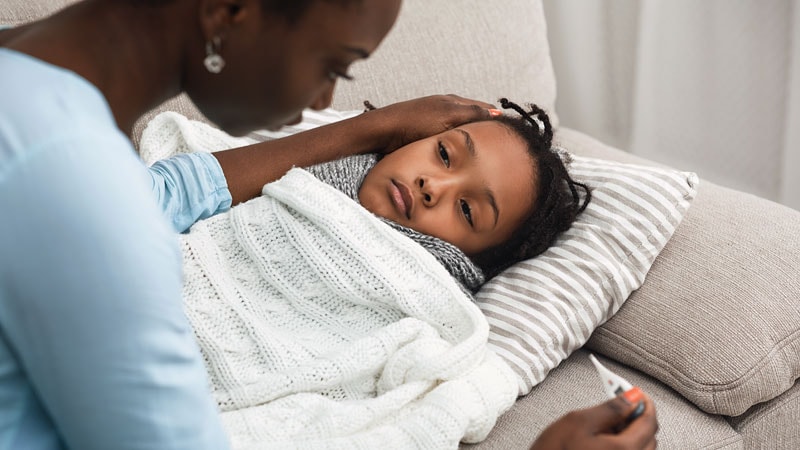Core Concepts
Vaccination status does not affect the infectivity timeline in children with COVID-19.
Abstract
The study focused on the infectivity timeline of children with COVID-19, regardless of vaccination status. Here is a breakdown of the key points:
- Findings:
- Half of children with COVID-19 were noninfectious 3 days after testing positive, irrespective of vaccination status.
- Return-to-school policies may not need to differ based on vaccine or booster status.
- Methodology:
- 76 children aged 7-18 were studied, with nasal swabs taken every other day for 10 days.
- Infectivity was determined by testing for cytopathic effect (CPE) in lab cultures.
- Duration of Infectivity:
- By day 3, half of the children were noninfectious.
- By day 5, less than 25% of children were infectious, regardless of vaccination status.
- In Practice:
- Current policies of isolation for five days post-positive test may be appropriate.
- Return-to-school policies may not need to consider vaccine or booster status.
- Comparison:
- Results align with a study in adults with the Omicron variant, showing no link between vaccination status and infectivity duration.
- Source:
- Led by Neeraj Sood, PhD, the study was published in JAMA Pediatrics on October 23.
Customize Summary
Rewrite with AI
Generate Citations
Translate Source
To Another Language
Generate MindMap
from source content
Visit Source
www.medscape.com
Vax Status Doesn't Impact Infectivity Timeline in Kids
Stats
"Half of kids with COVID-19 become noninfectious 3 days after testing positive, whether they were vaccinated or not."
"By day 5, less than 25% of children were infectious, regardless of vaccination status."
Quotes
"Our findings suggest that current policies requiring isolation for five days after a positive test might be appropriate, as the majority of children were not infectious by day 5."
Key Insights Distilled From
by Brittany Var... at www.medscape.com 10-23-2023
https://www.medscape.com/viewarticle/997628
Deeper Inquiries
How can these findings impact public health policies regarding COVID-19 in children?
The findings of the study suggest that the duration of infectivity in children with COVID-19, regardless of vaccination status, is relatively short. This information can have significant implications for public health policies concerning COVID-19 in children. For instance, it may influence decisions regarding isolation and return-to-school protocols. The study indicates that the majority of children were noninfectious by day 5, which could potentially lead to a reassessment of the current isolation period requirements. Public health authorities may consider adjusting guidelines to align with these findings, potentially reducing the duration of isolation for infected children. Additionally, the study's results may support the idea that return-to-school policies do not need to differentiate between vaccinated and unvaccinated children, as the duration of infectivity was similar regardless of vaccination status.
What are the implications of the small sample size on the study's reliability?
The small sample size of 76 children in the study raises concerns about the reliability and generalizability of the findings. A small sample size can limit the statistical power of a study, making it challenging to draw definitive conclusions or apply the results to a broader population. In this case, the limited number of participants may not fully represent the diversity of children affected by COVID-19. The findings may be more susceptible to random variations or biases, potentially affecting the accuracy of the results. Additionally, a small sample size can increase the risk of selection bias, where the characteristics of the participants may not be representative of the larger population. Therefore, while the study provides valuable insights, the small sample size underscores the need for further research with larger and more diverse cohorts to validate the findings and enhance the study's reliability.
How might the study's results influence the perception of COVID-19 risks in children?
The study's results, indicating a relatively short duration of infectivity in children with COVID-19, regardless of vaccination status, could impact the perception of COVID-19 risks in children. Understanding that a significant proportion of infected children become noninfectious within a few days may help alleviate concerns about the potential for prolonged transmission among children. This information could contribute to a more nuanced understanding of the risks associated with COVID-19 in pediatric populations. Parents, caregivers, and healthcare providers may find reassurance in knowing that infected children tend to clear the virus relatively quickly. The study's results may also highlight the importance of timely testing and isolation protocols in managing the spread of COVID-19 among children. Overall, the findings could potentially shift the perception of COVID-19 risks in children towards a more informed and evidence-based perspective.
0
